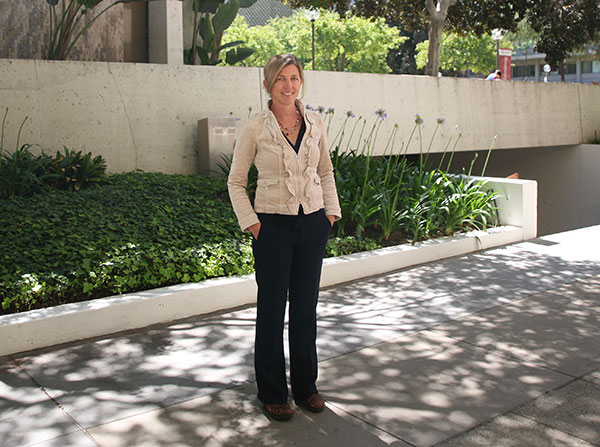
Casey O’Connell, MD
Casey O’Connell, MD, focuses on helping people facing rare diagnoses and forming bonds with her patients during the most trying moments of their lives.
Casey O’Connell, MD, was puzzled. For 20 years, her patient had been accumulating unusual and seemingly unrelated medical problems. By the time, she began treating the woman in 2007, O’Connell says the patient was dependent on oxygen, had fluid buildup in her abdomen and a high number of red blood cells causing blood clots and strokes.
“Ultimately, she had a very serious bleed into her brain,” says O’Connell, associate professor of clinical medicine at the Keck School of Medicine of USC and member of the USC Norris Comprehensive Cancer Center, remembering how the patient spent more than a year in and out of the hospital. “There were many occasions when her husband feared for her life.”
Doctor and patient kept fighting, however, and in 2010 a breakthrough came in the form of a case report in the New England Journal of Medicine, which described a patient with the same symptoms. O’Connell contacted the doctor in Massachusetts and another in Belgium, and the trio defined the new syndrome, TEMPI (Telangiectasias, Elevated erythropoietin level and erythrocytosis, Monoclonal gammopathy, Perinephric fluid collections, and Intrapulmonary shunting). A targeted treatment with FDA-approved therapies meant O’Connell’s patient “rose like Lazarus,” she says, eventually shedding the oxygen tank and leaving the hospital on her own two feet.
“These are the kinds of stories that really drive me,” O’Connell says. “I’m very interested in rare hematologic problems and I find this process of uncovering the truth in patients very rewarding.”
O’Connell conducts clinical and translational research in myeloproliferative neoplasms, myelodysplastic disorders and cancer-related clotting, among others.
“My first big research publication defined the concept of incidental pulmonary embolism, or the unexpected identification of blood clots in the lung among cancer patients undergoing routine staging CAT scans,” she says. “Now, eight years later, I’m speaking on that same topic and it’s an honor to be asked.”
While she is passionate about clinical research, O’Connell is most committed to patient care. “I enjoy the opportunity to develop relationships with patients, follow them for many years and offer them the latest in scientific understanding of their disease,” she says.
One of those patients, Norbert Gehr, made a lasting impression on the doctor.
“He was a very interesting man whom I first met early in my career at USC Norris,” O’Connell says. “For decades, he’d had a myeloproliferative disorder, which is a bone marrow disease that produces too many blood cells.”
The Brazilian-born entrepreneur had taken medication to control the pre-leukemic condition but it ultimately transformed to acute myeloid leukemia, a life-threatening disease. Although O’Connell prescribed an aggressive treatment for the disease and Gehr far outlasted the typical life expectancy for his diagnosis, he died in 2015.
“(Before he died,) he said he didn’t want other people to have to hear those words I’d told him when his disease had transformed,” O’Connell says.
As a result of his generosity, USC Norris received a $10 million gift from The Gehr Foundation to continue research into finding cures for myeloid malignancies.
“His gift is an incredible opportunity to study what causes leukemia and try to stop or prevent leukemia from developing,” O’Connell says. “So I have felt very emboldened by his faith in us to really try to take our myeloid malignancy program to the next level with a focus not only on optimizing our current treatment of patients but on really trying to achieve cures.”
Finding new treatments for these cancers drives O’Connell, who found her way into the medical field because she wanted to find a way to help others in a meaningful way.
“I really hope that my patients feel the passion I have for accompanying them on what is often their most difficult journey in life, hand in hand, utilizing my medical knowledge to bring clarity when I can and pushing the boundaries of modern medicine when they are eager to do so. That feels the most rewarding for me.”
By Melissa Masatani